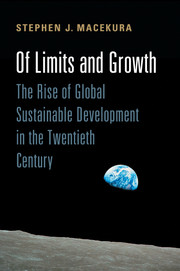Book contents
- Frontmatter
- Contents
- List of Illustrations
- Acknowledgments
- Introduction: NGOs and the Origins of “Sustainable Development”
- PART ONE ORIGINS
- 1 The Rise of International Conservation and Postwar Development
- 2 Parks and Poverty in Africa: Conservation, Decolonization, and Development
- 3 “The World's Most Dangerous Political Issue”: The 1972 Stockholm Conference and the Politics of Environmental Protection
- PART TWO REFORMS
- PART THREE PERSISTENT PROBLEMS
- Conclusion: The Growth and Limits of NGOs
- Archives
- Index
2 - Parks and Poverty in Africa: Conservation, Decolonization, and Development
from PART ONE - ORIGINS
Published online by Cambridge University Press: 05 July 2015
- Frontmatter
- Contents
- List of Illustrations
- Acknowledgments
- Introduction: NGOs and the Origins of “Sustainable Development”
- PART ONE ORIGINS
- 1 The Rise of International Conservation and Postwar Development
- 2 Parks and Poverty in Africa: Conservation, Decolonization, and Development
- 3 “The World's Most Dangerous Political Issue”: The 1972 Stockholm Conference and the Politics of Environmental Protection
- PART TWO REFORMS
- PART THREE PERSISTENT PROBLEMS
- Conclusion: The Growth and Limits of NGOs
- Archives
- Index
Summary
Although officials in environmental non-governmental organizations (NGOs) such as the International Union for the Conservation of Nature (IUCN) and World Wildlife Fund (WWF) often spoke about reconciling conservation and development, in practice their policies were unsuccessful at doing so. As the two leading international conservation organizations, the IUCN and WWF were formally global in their scope. Yet much of their activity involved continuing and expanding upon colonial-era arrangements, particularly national parks, in East Africa. NGO officials and their allies ran into extensive difficulties in promoting environmental protection in the postcolonial nations of the region. As East African leaders increasingly asserted their desire to carve out their own path toward economic development, the IUCN's and WWF's hopes for preservation clashed with the objectives and aspirations of the new countries' leaders and their counterparts in foreign aid agencies. Consequently, during the 1960s the policies put forth by NGOs became even more marginal to the larger developmental objectives of national governments and development lenders alike.
The IUCN and WWF, along with a variety of other Western activists, primarily attempted to persuade emerging nationalist leaders to adopt a preservationist set of policies. They promoted the creation of national parks, or areas of state-protected “wild” nature, that were legally cut off from human use. In emerging postcolonial states, this approach often meant maintaining and expanding existing parks and game reserves that had been set up by colonial authorities. IUCN and WWF leaders feared that independence movements would destabilize the relationships between government and citizens. It was unclear whether new nations would maintain and expand on the national parks, game reserves, and scattered conservation schemes that had been created in the colonial era. Many of the IUCN's early officials had cut their teeth working in imperial game reserves or nature protection schemes. As the process of decolonization accelerated, these officials, now working in NGOs, wanted to ensure the policies they had put in place during the colonial era would continue into the future. American conservationists found themselves allied with former imperial officials in the hope of preserving the colonial game reserves and national parks in East Africa. Conservationists claimed that national parks managed through scientific principles and elite guidance could produce real wealth, primarily through tourist dollars. NGO officials argued that parks, both for aesthetic and economic reasons, should be a vital component of the development process.
- Type
- Chapter
- Information
- Of Limits and GrowthThe Rise of Global Sustainable Development in the Twentieth Century, pp. 54 - 90Publisher: Cambridge University PressPrint publication year: 2015



